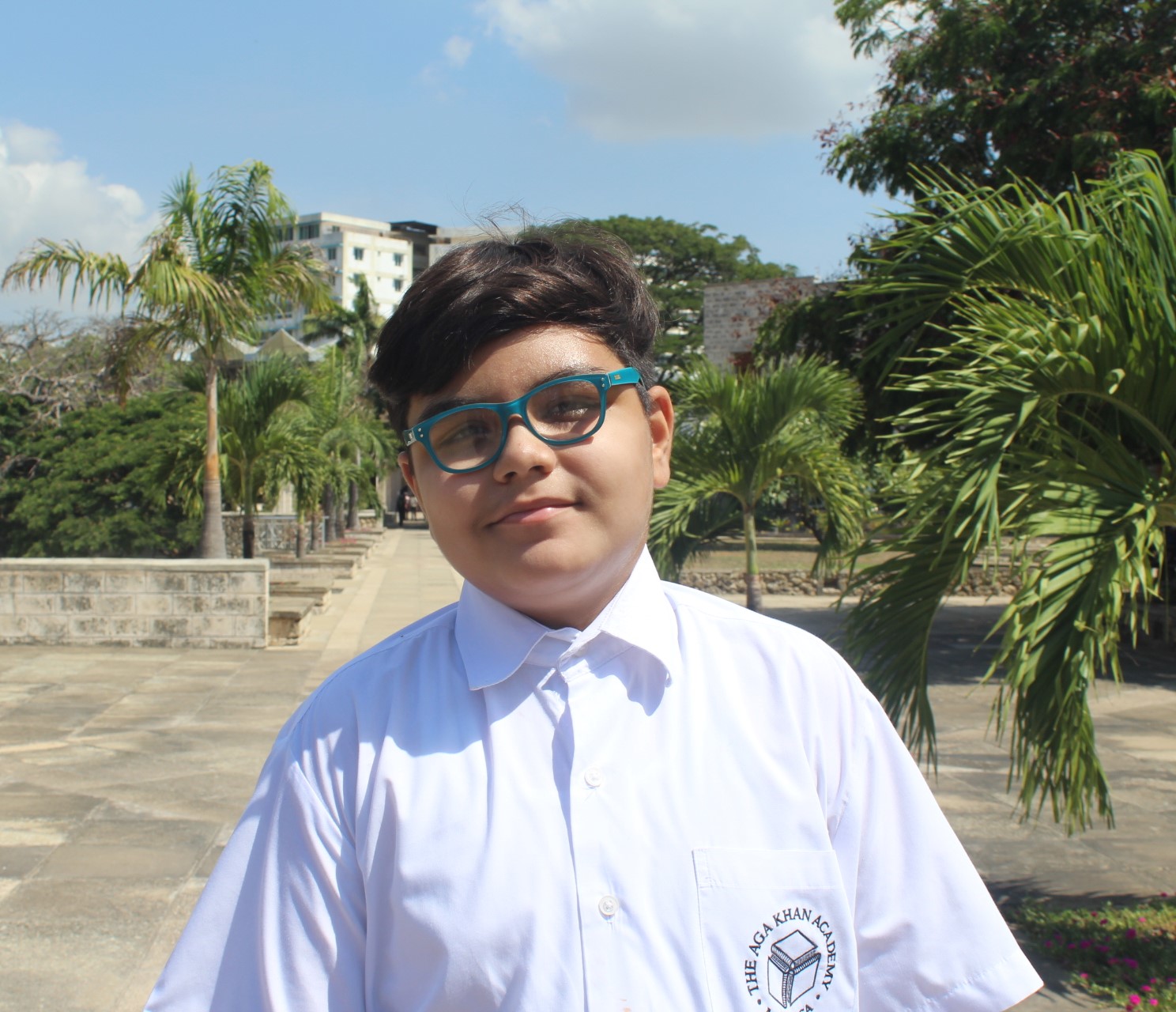Africa and Beyond Student Conference
About our Student Conference 2025
The Aga Khan Academy Mombasa, in collaboration with the International Baccalaureate’s (IB) Festival of Hope, is thrilled to host its first-ever Africa and Beyond Student Conference 2025 from 23-25 April. This student-led conference, for students from IB and non-IB schools, will be centred around creative arts, culture and service, under the inspiring hashtag #HopeInAction. This unique event will empower students to explore Africa’s vibrant heritage, creativity and commitment to service through “ubuntu", using these themes as lenses for social change. Designed by students, for students, the conference will provide a dynamic space to connect, learn and take actionable steps toward a hopeful and impactful future. Join us as we celebrate youth agency and Africa’s rich contributions to global culture and service!
What to expect:
Creative approaches: Discover innovative, hands-on methods in arts, culture and service that empower students to create change – starting with hope and moving towards action.
Empowering conversations: Connect with peers in dynamic discussions about how young leaders can use their passions to drive social impact in their communities.
Actionable takeaways: Walk away with practical strategies and insights to apply in your school or community, empowering you to turn your vision of hope into impactful change.
Workshop fees
- Early Bird: $100 (1 January–21 February)
- Regular: $150 (22 February–10 March)
- Accommodation: $40 per night
- Transport to and from the airport
- Internal transport for the conference
- All meals for the conference, including dinner from 23 to 25 April. Kindly note that meals on 22 and 26 are expected to be self-catered.
- Workshop resources
Accommodation for the Africa and Beyond Student Conference 2025 will be provided at the Kenya School of Government (KSG), located just five minutes away from the Academy in Mombasa. KSG offers a homely and unique experience that combines comfort, convenience and a vibrant setting perfect for student learning and cultural exchange.
Participants will stay in the newly built wing, where each spacious room is thoughtfully designed for individual comfort and productivity. Every room accommodates one person and features:
- A cosy individual bed for restful nights
- Air conditioning for a refreshing atmosphere
- A television for relaxation
- A personal work table and wardrobe for convenience
- An ensuite washroom for privacy and comfort
The serene setting and modern facilities of KSG make it a perfect place for participants to rest and recharge. Its proximity to the conference venue ensures ease of transport, with daily shuttle services provided to and from the Academy.
With schools from across Africa and beyond staying at KSG, participants will also have the opportunity to engage in cultural exchange and network with peers, creating lifelong connections and shared experiences.
You can explore the KSG gallery through the provided gallery link for a closer look at the venue. For reservations and payments, please contact admissions.mombasa@ksg.ac.ke directly.
Participants are expected to arrive on 22 April and depart by the morning of 26 April. Arrivals or departures outside of these dates will require personal arrangements for both transport and accommodation.
Sessions
The conference’s sessions will be a dynamic, student-led experience designed by students for students. Over three inspiring days, student facilitators will guide participants through an engaging mix of workshops, insightful discussions, creative performances and interactive activities. The first two days will feature skill-building workshops, thought-provoking panel discussions and collaborative activities that delve into themes of service, creative arts and cultural expression.
On the final day, participants will take part in immersive hands-on experiences, including a dedicated service day, an art exploration day and cultural sessions led by on-ground experts. This unique opportunity will allow students to dive deeply into local culture, fostering connections through art, service and cultural exchange, and empowering them to apply the "HopeInAction" mindset in meaningful ways.
We are looking for passionate students who are excited and willing to be part of the student team by hosting either a workshop, activity, etc. If you and your team are interested, kindly fill out this form and get in touch with the student conference design team at servicelearning@agakhanacademies.org.
Recreational Opportunities
During the conference at the Academy, students will have access to a variety of recreational spaces, including:
- A swimming pool
- An astroturf and main field
- A multi-purpose hall and more
These facilities provide plenty of opportunities for socialising, unwinding and fostering a sense of community after the day’s activities. You can explore our Academy through the picture gallery here.
Registration form
To register, please click here.
Each school is allowed to register a maximum of 10 students from Grade 9 and above and two adult chaperones. If your school has more, kindly get in touch with us through the contact email below.
Please note that payments must be made collectively by the school rather than individually by participants or chaperones. An invoice will be issued once payment confirmation is received and the full amount must be paid before the deadline. A receipt will be provided upon completion of payment.
Queries
For any queries, please contact the organising team at servicelearning@agakhanacademies.org.
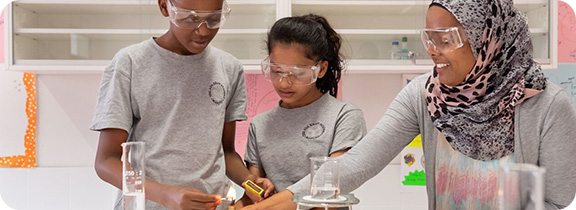
Middle Years Programme
The Senior School of the Aga Khan Academy Hyderabad is an authorised International Baccalaureate (IB) World School offering the Middle Years Programme (MYP).
What is the MYP?
The MYP is a challenging and exciting inquiry-based curriculum that actively engages students in their learning by encouraging them to make connections between what they study and the wider world. The five-year programme offers students access to a curriculum that is broad and balanced, conceptual and connected. What matters is not absorbing facts that can be repeated but developing ways of thinking that can be applied to new situations.
There are 8 subject groups within the MYP. Here at the Aga Khan Academy in Maputo our students study Portuguese and English language and literature, Portuguese, English and, in MYP3, French language acquisition, humanities, sciences, mathematics, visual arts, design and physical and health education.
In addition to the academic subjects our MYP students also develop leadership skills, library research skills and initiate and participate in service with the community.
In the final year of the programme students complete a personal project that encourages them to strengthen their approaches to learning skills, consolidate prior and subject-specific learning and develop an area of personal interest. In the context of the Aga Khan mission, vision and values, it also develops awareness of a community need and seeks to address it in a meaningful way. The personal project is challenging, motivational and interesting as each student develops a personal project independently.
MYP Learners
The MYP promotes open communication, based on mutual understanding and respect. It encourages students to become active, compassionate lifelong learners. The programme is holistic and as such is concerned with developing the whole person. Along with cognitive development, the programme addresses students’ social, emotional and physical well-being. Students are encouraged to become active and caring members of local, national and international communities who respect themselves, others and the world around them. They develop effective communication skills, social skills, self-management skills, research skills and thinking skills that will enable them to adapt to a range of contexts, as they make their way through life.
Assessment for learning
Teachers use a variety of assessment strategies to address the MYP subject-group objectives. The assessment for learning tasks include, among other things compositions, creating solutions or products in response to problems, essays, examinations, investigations, questionnaires, research tasks, performances, presentations, research task and reports.
In the fifth and final year of the MYP, to be eligible for the internationally recognised MYP certificate students must successfully complete eight eAssessments:
On-screen examinations in:
- Language and literature
- Individuals and societies (Humanities)
- Sciences
- Mathematics
- Interdisciplinary learning
ePortfolios (coursework) in:
- language acquisition
- physical and health education, arts or design
- the personal project
Students must also meet the school’s expectations for service and action.
The MYP bilingual certificate additionally requires successful results from on-screen examinations of:
A second language and literature instead of a course in language acquisition
The maximum total score for the IB MYP certificate is 56, with a grade from 1-7 assigned to each required eAssessment.
Students must achieve a total of at least 28 points, with a grade of ‘3’ or higher in each eAssessment component, to be eligible to receive the MYP certificate.
Transition to the IB Diploma (DP)
MYP subject groups form an important common foundation for all students and provide strong alignment with the six subject groups in the DP which follows. The two-year DP course encourages depth and breadth of learning and builds on students’ prior learning experiences. This encourages them to become confident, independent learners. It also encourages students to develop their critical thinking skills, self-management and global mindedness. Further, research carried out on behalf of the IB demonstrates that successful DP graduates are much more likely to be enrolled at top higher education institutions than entrants holding other qualifications.
Please visit the Admission Requirements page or contact us to find out more about applying to the MYP programme at the Academy.
*Only schools authorised by the IB Organization can offer any of its four academic programmes: the Primary Years Programme (PYP), the Middle Years Programme (MYP), the Diploma Programme, or the Career-related Programme (CP). Candidate status gives no guarantee that authorisation will be granted. For further information about the IB and its programmes, visit http://www.ibo.org.
Titus Mutemi: A transformative educator
In 2015, Titus Mutemi joined the Aga Khan Academy Mombasa as part of the Teacher Preparation Programme (TPP), which aims to train teachers to become transformative International Baccalaureate educators in their communities. This became a turning point for Titus' career as he has since further developed his extensive knowledge and skills and forged a pluralistic view of the world.
For Titus, the priority has always been to ensure that students have the best learning experience. As a result, he reviewed and vertically aligned the mathematics programme to ensure that there were no existing gaps between mathematics knowledge, concepts and skills across all the grade levels in his role as a Homeroom teacher. This step brought about a significant improvement in the students' performance of the subject.
Titus’ proudest moment at the Academy was to see the students he taught from Year 1 successfully complete their Primary Years Programme (PYP) Exhibition. “It was my pride to see them demonstrate their understanding of the world around them; to make more informed choices and confidently express themselves. In their projects, they engaged in discussing issues that require deeper and critical thinking skills, in the effort to make the world a better place.”
As the new PYP Coordinator, Titus looks forward to collaborating with the teachers to continue to develop effective teaching practices, which will give students the best learning experiences. He also plans to continue supporting students to help them realise their full potential.
Expressing her pride and excitement for Titus, Junior School Principal Annia Dear said, “Titus has come into his new role in an exciting, albeit challenging time, but has without hesitation accepted and moved forward with all that his role demands. His knowledge and understanding of the needs of students and teachers at this crucial time has been invaluable. His calm nature, positive attitude and commitment to achieving ongoing success with students, parents and teachers is an asset.”
Having been a part of the Academy for over five years now, Titus appreciates being part of a supportive community that is united by a common mission and vision to develop the leaders of tomorrow. As he expresses, “There is no greater joy than nurturing young learners and witnessing them grow into more responsible, reflective and increasingly independent individuals.”
Naail Lakhani: Learner Agency Through Coding
Naail Lakhani, a Year 5 student in Junior School, has demonstrated incredible maturity, leadership, and initiative since joining the Aga Khan Academy Mombasa in 2018. His proudest achievement is founding the Junior School Coding Club, an after-school extracurricular activity to teach coding to young minds. With approximately 30 members, Naail has been running the club successfully for over a year now.
Naail developed his passion for coding at the beginning of COVID-19 pandemic. “One day, I decided to search up easy coding for kids, and I stumbled upon this great website called Khan Academy which taught me different programming languages like C++ and Javascript,” said Naail. “I was then approached by Ms. Nuala Alibhai, the Head of Student Support and well-being in Junior School, who knew about my interest in coding and proposed the idea of starting a club in school. I agreed, and the coding club was born.”In addition to teaching coding skills, the club encourages its members to develop learner agency - shifting ownership of learning from teachers to students. "I believe that learner agency is important because it allows students to build their critical thinking and problem-solving skills, as well as perseverance and adaptability," Naail said. Members of the club attain learner agency by practicing coding rather than just learning it so that they can have the opportunity to apply their knowledge and test their understanding.
“I have been a part of the coding club since it first began, so for over a year now, and I have loved every minute of it,” says Kanika Tahiliani, a student in Year 4. “I learnt how to make shapes and add color to different objects like foods and a snowman using code.”
As Naail transitions to Senior School, he plans to continue and expand his club. By increasing the club’s capacity and opening up the club to both Junior and Senior School, Naail hopes to inspire more students to pursue coding. “My coding club is just the beginning,” said Naail. “I can already see myself working in tech companies like Google when I am older, or maybe I can even start my own company.”
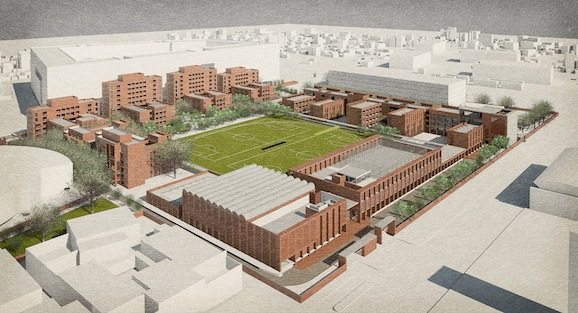
Our Campus
Built on a 17-acre site near Bashundara, Dhaka, the Aga Khan Academy Dhaka offers state-of-the art facilities on a secure, landscaped campus.
The Aga Khan Academy Dhaka is located on a 17-acre plot in Bashundara, Dhaka and will enrol 750 students (K-12) with a capacity to expand to 1,200. Residential facilities will be provided for students and staff to allow for wide participation and enable a diverse learning community. The school has been designed by renowned international architects to ensure the best possible educational experience in a physical environment that resonates with local Bangladeshi culture and architectural traditions.
The design for the Aga Khan Academy Dhaka received the award for best ‘Future Education’ project at the World Architecture Festival 2017, held on 15-17 November in Berlin, Germany. The award recognises the excellence of the school’s design as well as the project’s intention to generate positive social impact, which arises from the mission and values of the Aga Khan Academies and the wider Aga Khan Development Network (AKDN). The vision of the Academies is to develop future leaders with the skills and knowledge to positively support development in their own societies.
Construction of the Academy began in 2018, with the first batch of students being welcomed on campus in August 2022.
The Academy is the fourth in a network of about 18 planned Academies offering the highest international standard of education to students in countries across Africa, South and Central Asia, and the Middle East.
The campus has been specially designed by renowned architects and is purpose-built. Our facilities include the following academic and resource areas:
- subject and age-specific classrooms
- well-equipped science and computer laboratories
- library and resource centres
- rooms for the fine arts, music and dance, including individual practice booths and a music recording area.
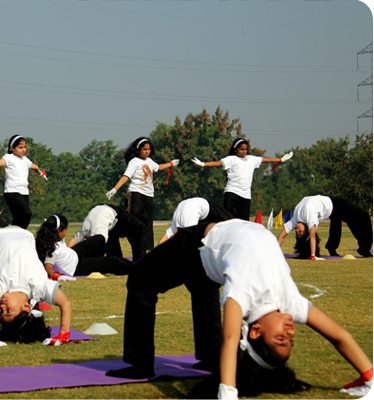 The Commons building will house the dining hall and an array of spaces for school activities. It is designed to be the hub of student activity, serving as the Academy’s main space for major school functions, including music and drama performances, and public lectures.
The Commons building will house the dining hall and an array of spaces for school activities. It is designed to be the hub of student activity, serving as the Academy’s main space for major school functions, including music and drama performances, and public lectures.
Sports facilities
Our sports facilities are extensive and, when complete, will include swimming and diving pools and fields for all sports.
We invite you to visit the Academy to take a tour of our campus.
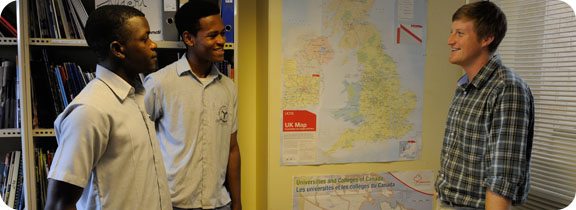
Diploma Programme
The Aga Khan Academy Mombasa has been an International Baccalaureate (IB) World School since May 2005. We offer the IB Diploma Programme (DP) to students in the final two years of school (aged 16–19).
The Diploma Programme is a demanding, pre-university-level course of studies. It is internationally recognised by over 2,000 universities worldwide.
The DP has a reputation for rigorous assessment of student achievement. Each student’s performance and level of knowledge are examined internally by teachers according to set criteria. They are also assessed externally by independent examiners according to global standards applied to all IB schools.
Our students study all the subjects covered in a traditional, broad curriculum, including languages, social sciences, experimental sciences, mathematics and the arts. The DP also takes the curriculum a step further through three unique programmes:
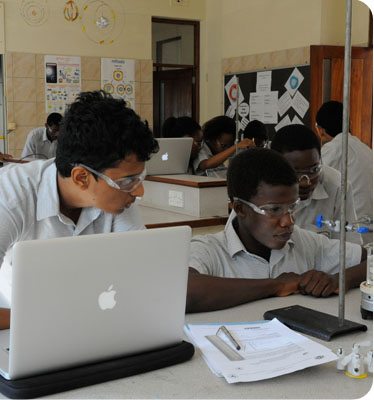
- Theory of knowledge
- Creativity, activity, service
- Extended essay
Theory of knowledge
Theroy of knowledge (TOK) is an interdisciplinary requirement unique to the International Baccalaureate Diploma Programme. It encourages students to reflect on the knowledge they gain both inside and outside the classroom.
One hundred hours of classroom time are dedicated to the TOK programme. We challenge our students to question the nature of knowledge across disciplines, to recognise biases and to analyse evidence using rational thought and argument. By making our students consider and appreciate different perspectives, TOK contributes towards a pluralistic outlook.
Creativity, activity, service
Creativity, activity, service (CAS) is an important component of the IB curriculum and is required for every DP student at the Academy. Our students participate actively in a variety of creative endeavours, physical activities and community service projects. They develop self-confidence, teamwork and leadership skills, and a sense of civil responsibility.
Students take part in sustainable projects that have real and lasting effects on the greater Mombasa community. They develop strength of character and an understanding of their ability to bring about change.
The CAS programme is valued for its power to transform the lives not only of students but also the people they work with. It serves as a platform for interpersonal exchange, personal growth and greater understanding of the issues we face as a global community.
Extended essay
For the extended essay, we require students to pick a subject of their choice and research and develop this subject in a 4,000-word essay. Students may choose to investigate a subject from one of their higher-level courses more deeply. Or they can broaden their academic experience by researching a subject in a field they are not currently studying.
Through the extended essay, we introduce students to the kind of independent research and writing skills expected at the university level.
For further information on the IB Diploma Programme at the Academy, please see the admission requirements or contact us.
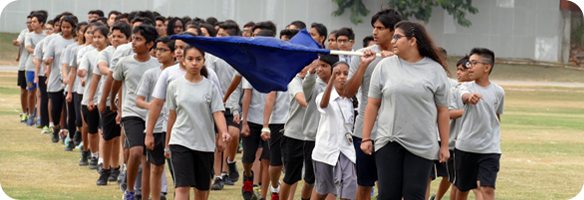
Diploma Programme
The Aga Khan Academy Hyderabad has received authorisation as an International Baccalaureate (IB) World School offering the IB Diploma Programme (DP). The programme is offered to students (aged 16–19) in the final two years of school.
The Diploma Programme is a demanding, pre-university-level course of studies. It is internationally recognised by over 2,000 universities worldwide.
The DP has a reputation for rigorous assessment of student achievement. Each student’s performance and levels of knowledge are examined internally by teachers according to set criteria. They are also assessed externally by independent examiners according to global standards applied to all IB schools.
Our students study all the subjects covered in a traditional, broad curriculum, including languages, social sciences, experimental sciences, mathematics and the arts. The DP also takes the curriculum a step further through three unique programmes:
- theory of knowledge
- creativity, activity, service
- extended essay.
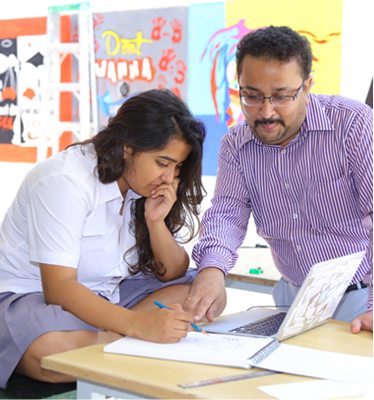 Theory of knowledge
Theory of knowledge
Theory of knowledge (TOK) is an interdisciplinary requirement unique to the International Baccalaureate Diploma Programme. It encourages students to reflect on the knowledge they gain both inside and outside the classroom.
One hundred hours of classroom time are dedicated to the TOK programme. We challenge our students to question the nature of knowledge across disciplines, to recognise biases and to analyse evidence using rational thought and argument. By making our students consider and appreciate different perspectives, TOK contributes towards a pluralistic outlook.
Creativity, activity, service
Creativity, activity, service (CAS) is an important component of the IB curriculum and is required for every DP student at the Academy. Our students participate actively in a variety of creative endeavours, physical activities and community service projects. They develop self-confidence, teamwork and leadership skills, and a sense of civil responsibility.
Students take part in sustainable projects that have real and lasting effects on the greater Hyderabad community. They develop strength of character and an understanding of their ability to bring about change.
The CAS programme is valued for its power to transform the lives not only of students but also the people they work with. It serves as a platform for interpersonal exchange, personal growth and greater understanding of the issues we face as a global community.
Extended essay
The extended essay requires students to pick a subject of their choice and research and develop it into a 4,000-word essay. Students may choose to investigate a subject from one of their higher-level courses more deeply. Or they can broaden their academic experience by researching a subject in a field they are not currently studying.
Through the extended essay, we introduce students to the kind of independent research and writing skills expected at the university level.
For further information on the IB Diploma Programme at the Academy, please see the admission requirements or contact us.
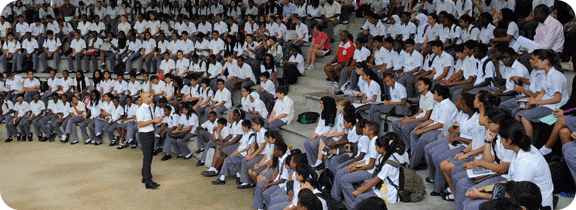
The Junior and Senior Schools
The Aga Khan Academy Mombasa is made up of two schools, the Junior School and the Senior School, which together cater to students from year 1 (age 6) to university entrance.
Junior School
We currently welcome 181 day students in the Junior School (years 1–5), most of whom are from the local area. All Junior School students follow the International Baccalaureate (IB) Primary Years Programme (PYP). Through the PYP, our students learn to be confident, independent and creative learners.
The Junior School building has been designed to address the needs of younger children, with age-appropriate facilities and classrooms. In addition to the PYP classrooms, the building contains the Junior School library, and music, art and information technology rooms. There are also large playing fields and an adventure playground.
Senior School
The Senior School currently houses over 500 students. Those from the local area attend as day students, while those from other parts of the country or region live on campus as part of the residential programme.
Students in the Senior School pursue either the IB Middle Years Programme (MYP) or the IB Diploma Programme (DP).
The Middle Years Programme is for students in years 6–10. It helps them master essential skills and knowledge, and teaches them to be critical and analytical thinkers.
The Diploma Programme is offered to students in the final two years of school. It is an internationally recognised and demanding programme that prepares students for university entrance.
The school caters to both the intellectual and personal growth of students.
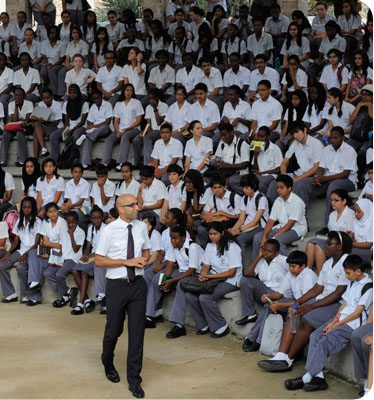
The Senior School has a wide range of facilities that include:
- Laboratories for the sciences as well as for home science and computers
- Art and music rooms
- Library and resource centre
- Religion and culture room
- Career counselling centre
- Design and technology workshop
- Student and teacher lounges
- Theatre
- Multipurpose hall
- Cafeteria and dining area
The building is networked so that computers become common resources for teachers and students. The multipurpose hall can be used for a variety of events ranging from theatre productions to parent-teacher meetings. The school also has swimming, basketball, badminton, volleyball and gymnastics facilities as well as playing fields for soccer, field hockey and athletics.
For further information about applying to any of the programmes offered at the Aga Khan Academy Mombasa, please refer to the admission requirements.
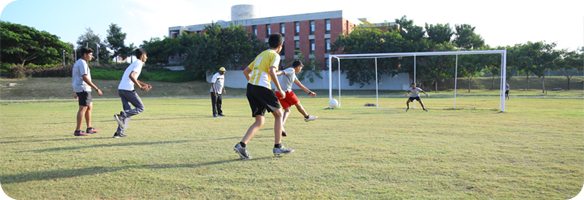
Enrichment Programme
The enrichment programme enables students to realise their potential in a variety of settings beyond the classroom. Students develop a sense of self-awareness and an understanding of school and community needs and opportunities. They also learn how to apply their gifts and skills to make a positive impact.
At the Academy, we believe in a balanced, rounded, comprehensive school experience. As this includes both academic and enrichment experiences, we encourage our students to do their best both in and outside the classroom.
We offer outstanding sports facilities that include:
- swimming and diving pools
- cricket pitch
- sports fields, for soccer, hockey and athletics
- tennis and squash courts
- athletics track.
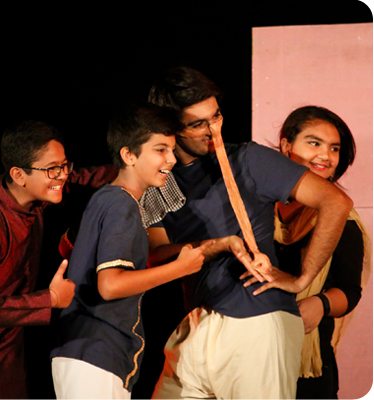 Children with special sporting gifts are encouraged to develop their talents in every way. Children with special gifts in music, art or drama are similarly encouraged through opportunities to practise and perform while at the Academy.
Children with special sporting gifts are encouraged to develop their talents in every way. Children with special gifts in music, art or drama are similarly encouraged through opportunities to practise and perform while at the Academy.
Our enrichment programmes for both day and residential students are clustered into three main streams, each with a different focus:
Creativity and culture
Whether through visual or performing arts, this cluster engages students to think creatively and express their identities and thoughts aesthetically. Through theatre, art, music and drama, students learn to work together and infuse their projects with values and lessons from other parts of their schooling. Individual and collaborative creative projects emphasise growth and development through personal challenge, ultimately resulting in achievable personal goals.
Programmes are currently offered in contemporary dance, arts and crafts, animation, robotics, science, software, photography, chess, drama and music.
Physical
The student as a reflective practitioner is a basic tenet of the physical cluster. Through physical sport, both competitive and non-competitive, students are challenged in their physical growth, and learn values such as good sportsmanship, teamwork and ethical behaviour. We encourage them to extend themselves by trying different activities and working with teammates to pass on their knowledge. In line with developing the student as a whole, a healthy lifestyle complements and enhances academic achievement.
Programmes are currently offered in football, squash, basketball, cricket, swimming, table tennis, tennis and yoga/gym.
Language and service
At the Academy, we encourage knowledge and understanding of humanity and civil society. Through their involvement in citizenship activities, students gain an understanding of the practical implications of their work and study. By collaborating with community groups on sustainable projects, they develop an appreciation for human rights and human dignity, and of how their actions impact the world around them.
Programmes are currently offered in Model United Nations, Reflections (school publication), yearbook, organic farm, film making, book club, foreign language and mother tongue, and environment club.
To learn more about the Academy's programme, please visit the Academic Programme page.
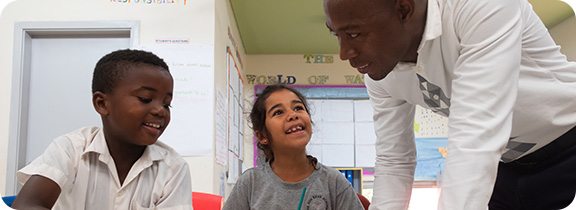
Admission Requirements
Choosing a school is an important decision in a child's and parent's life. We are here to help and answer any questions you might have.
We currently welcome enquiries of students for our Nursery, Junior and Senior School.
Our programmes are based on the principles and practices of the International Baccalaureate. The admission requirements for the Academy's programmes, including language requirements, are outlined below.
For the Aga Khan Academy Maputo, the admissions process can be followed in either English or Portuguese.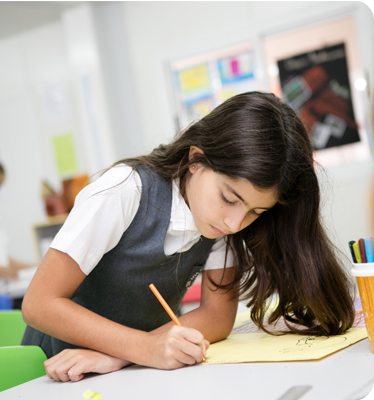 Admission is competitive and based on student merit, regardless of a family’s ability to pay. The Academy endeavours to meet the demonstrated financial need of each admitted student.
Admission is competitive and based on student merit, regardless of a family’s ability to pay. The Academy endeavours to meet the demonstrated financial need of each admitted student.
Nursery School
Kindergarten 1, 2 and 3: Early Years Programme
Students entering Kindergarten 1 must be 3 years of age by the 31st of August of the year of entry.
All prospective students must demonstrate the potential for high achievement. Each applicant will participate in a variety of assessment exercises.
Students may enter the nursery section without a strong prior knowledge of one of the languages of instruction, English or Portuguese.
Junior School
Grades 1–5: Primary Years Programme (PYP)
Students entering Grade 1 will ideally have completed at least three years of nursery school and must be 6 years of age by the 31st of August of the year of entry.
All prospective students must demonstrate a potential for high academic achievement and competency in literacy and numeracy. Each applicant will participate in a variety of assessment exercises.
Students may enter the first three years of the PYP without a strong prior knowledge of one of the languages of instruction, English or Portuguese. However, in the last three years of the PYP, students must have a basic level of proficiency in both languages before they may be admitted.
Senior School
Grades 6–10: Middle Years Programme (MYP)
All students applying for a place in the Senior School must have attained high scholastic achievement in their former educational institutions. They must also demonstrate a keen interest and participation in community service projects outside the classroom and/or extracurricular activities such as sporting activities, clubs, arts and music.
All prospective students must demonstrate a potential for high academic achievement and competency in literacy and numeracy at the school in addition to providing past student grade reports and certificates of achievement.
Grades 11–12: Diploma Programme (DP)
Applicants for the Diploma Programme must have demonstrated outstanding academic achievement as well as a record of active involvement in extracurricular and community service activities.
New students will not be accepted in the year of the Diploma exam
Applying to the Academy
For further information about admissions, please contact admissions.maputo@agakhanacademies.org.

